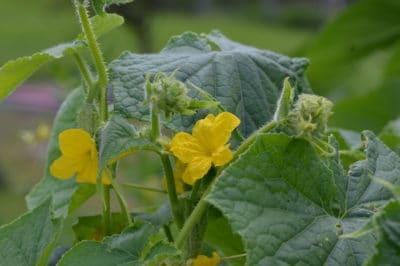Water
Every fruit a cucumber vine produces contains 95% water. As some of the thirstiest veggies, cukes need 1 inch of water per week (including rain). That’s 6 gallons (22.7 litres) for every 1 square foot of soil. In dry, hot weather above 85°F (29.4° C), increase the amount to 2 inches per week.
Expert gardener’s tips:
- When wind accompanies hot, dry weather, cukes’ leaves release more moisture than their roots can quickly replace. The result is wilted, heat-stressed plants.
- Spread your weekly watering over two or three sessions, and be consistent. Inconsistently or inadequately watered cukes often produce deformed, bitter fruit.
- If possible, water with a drip system or soaker hose to keep the leaves dry. Wet ones are more susceptible to disease.
Nutrients
Keep you cukes’ leaves healthy and green with an organic, granular fertilizer containing chlorophyll-building sulphur and magnesium. For better absorption, choose a formula with humic acid and bacteria.
Expert gardeners’ tip: A slow-release fertilizer will nourish your cukes from their flowering through harvesting stages.
Organic Pest Management
Aphids and cucumber beetles are cucumber leaves’ two major pests. Colonies of aphids feast on sap and cover the leaves with their sticky honeydew waste. Cucumber beetles eating holes in the leaves frequently transmit deadly bacterial wilt disease.
Aphid Control
For eco-friendly, low-cost aphid control, treat your infested cukes with organic insecticidal soap. Spray until it drips from all their surfaces, and repeat at the label’s recommended frequency.
Cucumber Beetle Prevention
- Floating row covers made from lightweight fabric let sun, air and moisture reach your cukes while keeping cucumber beetles away. Put them in place at planting time and leave them up 24/7 until the beetle’s egg-laying season passes.
- Keep weeds out of the cuke patch. The beetles use them as an alternative food source.
Disease Management
In addition to beetle-transmitted wilt, cucumber leaves are prone to mildew and leaf spot diseases.To prevent or contain powdery and downy mildews:
- Give your cukes at six or more hours of daily sun.
- Space sprawling vines 3 to 5 feet 9.92 to 1.5 meters) apart. Allow 1 foot (.31 meters) between trellised ones.
- Water from beneath.
- Immediately remove and dispose of mildewed leaves.
The only way to keep leaf spot diseases from spreading is to remove and destroy infected vines. Prevention measures include watering from beneath, proper spacing, weed removal and cutting back excessive leaves.
